unit 1-3
初一英语1-3单元知识点
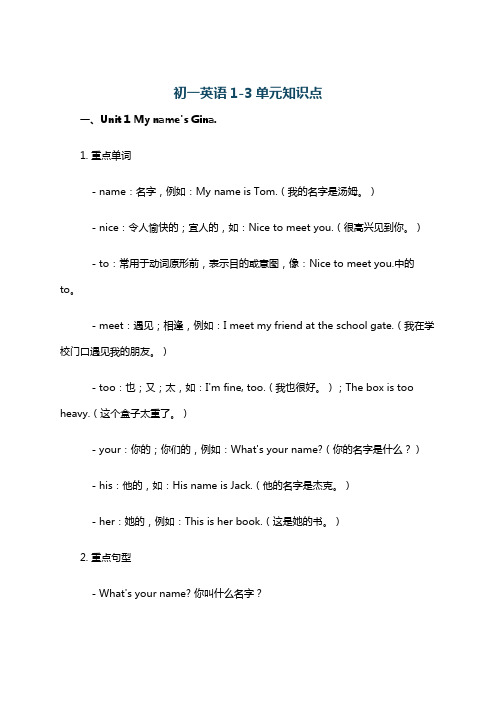
初一英语1-3单元知识点一、Unit 1 My name's Gina.1. 重点单词- name:名字,例如:My name is Tom.(我的名字是汤姆。
)- nice:令人愉快的;宜人的,如:Nice to meet you.(很高兴见到你。
) - to:常用于动词原形前,表示目的或意图,像:Nice to meet you.中的to。
- meet:遇见;相逢,例如:I meet my friend at the school gate.(我在学校门口遇见我的朋友。
)- too:也;又;太,如:I'm fine, too.(我也很好。
);The box is too heavy.(这个盒子太重了。
)- your:你的;你们的,例如:What's your name?(你的名字是什么?) - his:他的,如:His name is Jack.(他的名字是杰克。
)- her:她的,例如:This is her book.(这是她的书。
)2. 重点句型- What's your name? 你叫什么名字?- 回答:My name's...或者I'm...,例如:What's your name? My name's Gina.(你叫什么名字?我的名字是吉娜。
)- Nice to meet you. 很高兴见到你。
- 回答:Nice to meet you, too.(也很高兴见到你。
)- Are you...? 你是……吗?- 回答:Yes, I am. / No, I'm not.例如:Are you Tom? Yes, I am.(你是汤姆吗?是的,我是。
)3. 语法点- 形容词性物主代词:your(你的/你们的)、his(他的)、her(她的)。
形容词性物主代词后面要接名词,用来表示所属关系,如:your book(你的书),his pen(他的钢笔),her bag(她的包)。
八年级上册Unit 1 topic 3 知识点总 结

八年级上册Unit 1 topic 3The school sports meet is coming.一.重要知识点总结:Section A1. The school sports meet is coming. will you take part in it?学校的运动会马上就要来了,你准备参加吗?(1)sports meet 运动会;名词作定语修饰名词时,一般用单数形式,但woman, sport作定语时通常用复数形式;e.g. women teachers sports shoes(2)be + 短暂性动词现在进行时态表示即将发生的动作,类似的短暂性动词:go, come, fly, start, leave等;e.g. What time are you starting? 你们什么时候出发?2. Which sport will you take part in?你将要参加哪一项运动?(1) take part in + 活动参加....... ;take part in = be in = join in ;我将参加接力赛。
I will take part in the relay race.= I will join in the relay race.= I will be in the relay race.3. The boys’ 800-meter race男子800米赛跑。
(1)800-meter = 800 meters(2)15-year-old “15岁的” 15 years old “15岁”e.g. He is a 15-year-old boy. = The boy is 15 years old.4.I’ll be in the long jump and the high jump.我将会参加跳远和跳高。
take part in = be in = join in 参加 + 活动;5.I believe you will win.我相信你会赢的。
Unit-1-3-高职英语课文及翻译
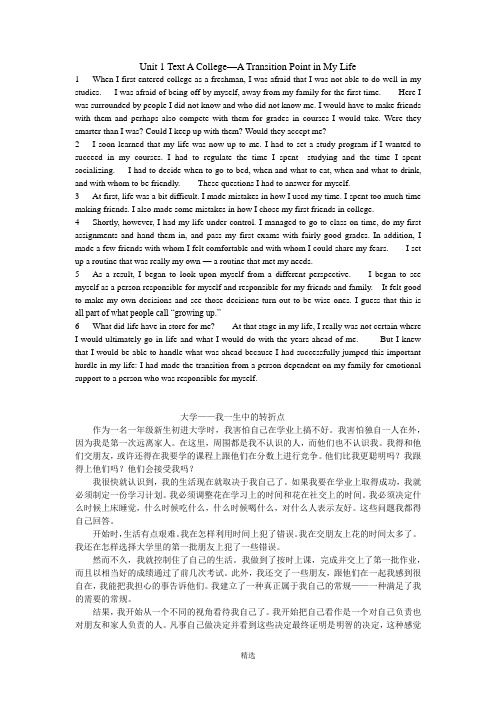
Unit 1 Text A College—A Transition Point in My Life1 When I first entered college as a freshman, I was afraid that I was not able to do well in my studies. I was afraid of being off by myself, away from my family for the first time. Here I was surrounded by people I did not know and who did not know me. I would have to make friends with them and perhaps also compete with them for grades in courses I would take. Were they smarter than I was? Could I keep up with them? Would they accept me?2 I soon learned that my life was now up to me. I had to set a study program if I wanted to succeed in my courses. I had to regulate the time I spent studying and the time I spent socializing. I had to decide when to go to bed, when and what to eat, when and what to drink, and with whom to be friendly. These questions I had to answer for myself.3 At first, life was a bit difficult. I made mistakes in how I used my time. I spent too much time making friends. I also made some mistakes in how I chose my first friends in college.4 Shortly, however, I had my life under control. I managed to go to class on time, do my first assignments and hand them in, and pass my first exams with fairly good grades. In addition, I made a few friends with whom I felt comfortable and with whom I could share my fears. I set up a routine that was really my own — a routine that met my needs.5 As a result, I began to look upon myself from a different perspective. I began to see myself as a person responsible for myself and responsible for my friends and family. It felt good to make my own decisions and see those decisions turn out to be wise ones. I guess that this is all part of what people call “growing up.”6 What did life have in store for me? At that stage in my life, I really was not certain whereI would ultimately go in life and what I would do with the years ahead of me. But I knew that I would be able to handle what was ahead because I had successfully jumped this important hurdle in my life: I had made the transition from a person dependent on my family for emotional support to a person who was responsible for myself.大学——我一生中的转折点作为一名一年级新生初进大学时,我害怕自己在学业上搞不好。
八年级下册英语Unit1unit3基础复习题
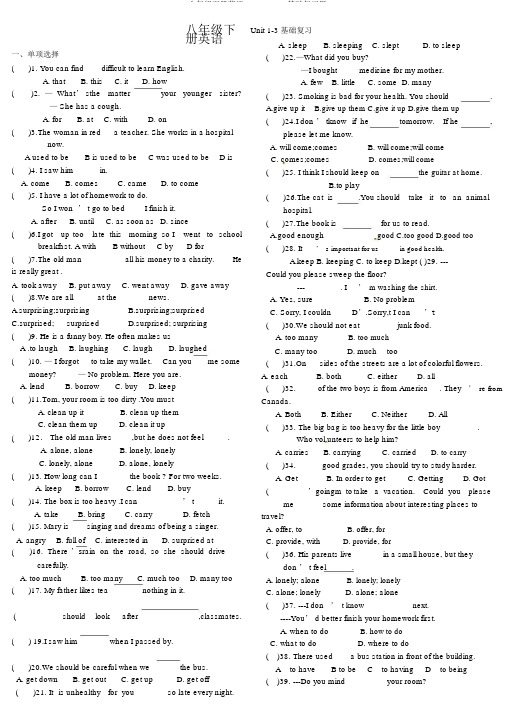
八年级下册英语一、单项选择( )1. You can find ___ difficult to learn English.A. thatB. thisC. itD. how( )2. — What’ sthe matter your younger sister?— She has a cough.A. forB. atC. withD. on( )3.The woman in red___a teacher. She works in a hospital now.A used to beB is used to beC was used to beD is ( )4. I saw him _____ in.A. comeB. comesC. cameD. to come( )5. I have a lot of homework to do.So I won ’ t go to bed____ I finish it.A. afterB. untilC. as soon asD. since( )6.I got up too late this morning so I went to school ______breakfast. A with B without C by D for( )7.The old man _______all his money to a charity. He is really great .A. took awayB. put awayC. went awayD. gave away ( )8.We are all_____ at the____ news.A.surprising;surprisingB.surprising;surprisedC.surprised; surprisedD.surprised; surprising( )9. He is a funny boy. He often makes us ________A .to laugh B. laughing C. laugh D. laughed( )10. — I forgot to take my wallet. Can you me some money? — No problem. Here you are.A. lendB. borrowC. buyD. keep( )11.Tom, your room is too dirty .You must _______A. clean up itB. clean up themC. clean them upD. clean it up( )12. The old man lives ____,but he does not feel _____.A. alone, aloneB. lonely, lonelyC. lonely, aloneD. alone, lonely( )13. How long can I _______the book ? For two weeks.A. keepB. borrowC. lendD. buy( )14. The box is too heavy .I can ’ t _____it.A. takeB. bringC. carryD. fetch( )15. Mary is singing and dreams of being a singer.A. angryB. full ofC. interested inD. surprised at( )16. There ’s rain on the road, so she should drive carefully.A. too muchB. too manyC. much tooD. many too ( )17. My father likes tea nothing in it.( should look after ,classmates.( ) 19.I saw him when I passed by.( )20.We should be careful when we the bus.A. get downB. get outC. get upD. get off( )21. It is unhealthy for you ______ so late every night. Unit 1-3 基础复习A. sleepB. sleepingC. sleptD. to sleep()22.—What did you buy?—I bought ____ medicine for my mother.A. fewB. littleC. someD. many()23. Smoking is bad for your health. You should.A.give up itB.give up themC.give it upD.give them up()24.I don ’ tknow if he tomorrow. If he, please let me know.A. will come;comesB. will come;will comeC. comes;comesD. comes;will come()25. I think I should keep on the guitar at home.B.to play()26.The cat is.You should take it to an animal hospital.()27.The book is for us to read.A.good enough good C.too good D.good too()28. It’ s important for us_____ in good health.A.keepB. keepingC. to keepD.kept ( )29. ---Could you please sweep the floor?---________. I’ m washing the shirt.A. Yes, sureB. No problemC. Sorry, I couldn D’.Sorry,t I can’t()30.We should not eat ________junk food.A. too manyB. too muchC. many tooD. much too()31.On __ sides of the streets are a lot of colorful flowers.A. eachB. bothC. eitherD. all()32._____of the two boys is from America . They’ re from Canada.A. BothB. EitherC. NeitherD. All()33. The big bag is too heavy for the little boy ________.Who vol unteers to help him?A. carriesB. carryingC. carriedD. to carry()34. _____ good grades, you should try to study harder.A. GetB. In order to getC. GettingD. Got(’goingm to take a vacation. Could you please _____me ______some information about interesting places totravel?A. offer, toB. offer, forC. provide, withD. provide, for()36. His parents live ______ in a small house, but they don ’ t feel.A. lonely; aloneB. lonely; lonelyC. alone; lonelyD. alone; alone()37. ---I don’ t know ___________next.----You’ d better finish your homework first.A. when to doB. how to doC. what to doD. where to do( )38. There used____a bus station in front of the building.A to haveB to beC to havingD to being( )39. ---Do you mind _________your room?---No, I ’doll that after finishing _________this article. A. 20.My parents often make me (sweep)the floor clean, write B. clean, writing 21.Would you mind (open)the windows?C. cleaning, writeD. cleaning, writing 22.He can stay there for ten hours without (move). ( )40.The harder you study, ______grades you ’ ll get. 23. Could you please_______(not play)football on the street?A. goodB. BetterC. bestD. the better 24.You shouldn ’ t always think about (you).二、翻译句子25.We expect (visit) the Great Wall one day.1. 请你倒一下垃圾好吗?26.He told me (not wait) for him.Could you please __ _ __ _ _ the rubbish? 27.They agreed (help) each other.2 .我一在电视机前坐下,我妈妈就过来了。
仁爱版九年级上册英语-Unit1:Topic3单词汇总+知识梳理

仁爱九上-Unit1 Topic3知识梳理重点短语:1.on the phone 通过电话,在电话上2.have/has been in…某人在某地待了长时间3.get/be used to(doing) sth. 习惯于(做)某事ed to do sth. 过去常常做某事5.as a matter of fact/in fact事实上6.show sb. sth.=show sth. to sb.给某人展示某物7.homeless people 无家可归的人8.live a normal/happy/hard life过着一种正常的/幸福的/艰苦的生活9.in need 在困难时,在贫困之中10.decide to dosth.决定做某事decide on sth. 决定某事make a decision 做决定11.offer sb.sth.=offer sth. to sb.给某人提供某物12.medical treatment 医疗救助13.provide sb.with sth.=provide sth. for sb.为某人提供某物14.feel good about oneself 自我感觉良好15.change for the better 变得更好16.get/be in trouble 陷入困境17.pick up 捡起,(用车)接(人或物)18.help sb. out 帮助某人摆脱困境19.the cause of 导致……的原因the result of ……的结果the reason for ……的原因20.on purpose 故意21.have a problem with…有……问题22.think of… as…把……视为……23.raise one’s children抚养孩子24.afford sth. for sb. 为某人支付/担负某物 afford to do sth. 担负得起做某事25.make contributions to(doing)sth.在(做)某事方面做出贡献26.as a result 结果27.without the help of…没有……的帮助lions of 数百万29.according to 据……所说,按……所报道30.plenty of 大量的31.短暂性动词----延续性动词:die---be deadleave---be away (from)come/become---bejoin---be in/be a member ofbuy---haveborrow---keepopen---be openclose---be closedbegin/start---be onmarry---be marriedfall ill---be ill词形转换:1.visit v./n.参观,访问,游览visitor n.参观者,来访者2.chemical adj.化工的,化学的chemistry n.化学,化学物质3.homeless adj.无家的homelessness n.无家可归4.treat v.对待,治疗treatment n.疗法,治疗5.basic adj.基本的,基础的base n.基础6.important adj.重要的importance n.重要性,重要重点句型:1.You have been in New York for a long time.你已经在纽约待了很长时间了。
人教版英语七年级上册 StarterUnits 1-3知识点

人教版英语七年级上册StarterUnits 1-3知识点Starter Unit 1- Unit 3Unit 1 Good morning!见面问候语的表达问候语:Good morning/ afternoon/ evening.How are you ---Just OK, thank you.How are you ---Not bad, thanks.Hi! Hello! How do you do道别用语:Nice/ Glad to meet/ see you.(meet用于初次见面,see用于熟人间)Nice to meet/ see you, too.Goodbye. Byebye. Bye.See you (later/ tomorrow/ next time)! So long! Good night!Unit 2 What’s this in English一不定冠词an;a 的用法不定冠词的用法不定冠词有两个,a 和an。
a用在辅音开头的单词前面;an用于以元音开头的单词前。
如:a book, an apple。
不定冠词用在但数可数名词前表示“某一个”。
如:There is a policeman at the door.不定冠词用在单数可数名词之前,表示“任何,每个”。
如:A car must be insured.不定冠词用于头一次出现的单数名词之前。
如:There is a box in the room. The box is heavy.不定冠词和名词连用作表语或同位语,主要说明某个人或东西所属类别。
如:She is a teacher.定冠词用在价格、速度、比率等短语中。
如:six kilometers an hour 3 times a day不定冠词用在专有名词前。
如:He wants to buy a Kodak.不定冠词用于某些固定短语中。
如:have a try试一下take a break 休息一下have a good time 玩得痛快as a matter of fact 事实上in a word 总而言之二询问物体的表达:What’s this/ that in English回答:It’s a/an + 单数可数名词不能用This isIs this a pen Yes, it is.Unit 3 What color is it定冠词the 的用法:用于特指的人、物/群体和个体名词的单数/复数连用Give me the book.特指说话双方都知道的人/事物。
初一英语下册Unit 1-Unit 3知识点总结
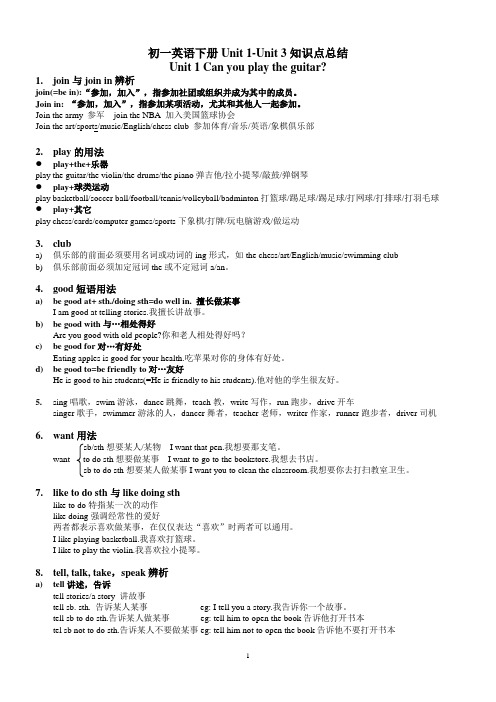
初一英语下册Unit 1-Unit 3知识点总结Unit 1 Can you play the guitar?1.join与join in辨析join(=be in):“参加,加入”,指参加社团或组织并成为其中的成员。
Join in: “参加,加入”,指参加某项活动,尤其和其他人一起参加。
Join the army 参军join the NBA 加入美国篮球协会Join the art/sports/music/English/chess club 参加体育/音乐/英语/象棋俱乐部2.play的用法●play+the+乐器play the guitar/the violin/the drums/the piano弹吉他/拉小提琴/敲鼓/弹钢琴●play+球类运动play basketball/soccer ball/football/tennis/volleyball/badminton打篮球/踢足球/踢足球/打网球/打排球/打羽毛球●play+其它play chess/cards/computer games/sports下象棋/打牌/玩电脑游戏/做运动3.cluba)俱乐部的前面必须要用名词或动词的ing形式,如the chess/art/English/music/swimming clubb)俱乐部前面必须加定冠词the或不定冠词a/an。
4.good短语用法a)be good at+ sth./doing sth=do well in. 擅长做某事I am good at telling stories.我擅长讲故事。
b)be good with与…相处得好Are you good with old people?你和老人相处得好吗?c)be good for对…有好处Eating apples is good for your health.吃苹果对你的身体有好处。
d)be good to=be friendly to对…友好He is good to his students(=He is friendly to his students).他对他的学生很友好。
英语复习Starter1-3 Unit1-4

英语复习Starter unit1---31.Good morning, Helen! Good afternoon, Frank! Good evening, Alice!Good morning, Dale! Good afternoon, Eric! Good evening, Cindy! 2. How are you? 你好吗? I’m fine, thanks/thank you. 我很好,谢谢!How are you? 你好吗? I’m OK, too. 我也很好.How is Mike? 迈克怎么样? He is very well. 他很好.3. What’s this in English? 用英语说,这是什么? It’s an orange. 这是一个橘子.What’s this in English? 用英语说,这是什么?It’s a key/ map/ jacket…这是一个钥匙.一张地图.一件夹克衫.4. What color is it? 它是怎么颜色的? It’s white and black. 它是黑白相间的.What color is the/ his key? 钥匙是什么颜色的? It’s yellow. 它是黄色的.Unit11. What’s your name? 你叫什么名字?My name’s (=My name is ) Gina. 我的名字是Gina. What’s your sister’s name? 你姐姐叫什么名字?My sister’s name is …我姐姐的名字是…What’s his name? 他叫什么名字? His name’s (=His name is ) Tony. 他的名字是Tony. What’s her name? 她叫什么名字? Her name’s (= her name is) Mary. 她的名字是Mary.2.first name (given name) 名: Tony, Gina. Mary. Mingminglast name (family name) 姓: Green, Smith, Brown, Zhang3. zero one two three four five six seven eight nineWhat’s your/ his / her/ telephone number? 你的/他的/她的电话号码是多少? It’s…4. call sb call+号码call sb at +号码给某人打电话5. A: Who is that? 你是谁?B: This is LiMing (speaking). 是李明.Unit21.This is my pencil.→Is this your pencil?Yes, it is. It’s my pencil. / No, it isn’t. It’s his/ her/ Mary’s pencil.2. How do you spell it/“watch”? (= Spell it, please!) 怎么拼写这个词?W-A-T-C-H. Can you spell it, please? 你能拼写这个词吗?Yes, I can. W-A-T-C-H.Excuse me. 请问,打扰一下.3.Lost and found 失物招领Lost: Found:My school ID card. Is this your notebook?My name is Tony. Please call Mary at 123456.Please call 123456.Unit31.I am…You are…Is your book…?They/ We are…He /She/ It is…(单数第三人称)I am Tom.→ Are you Tom? Yes,I am./ No, I am not.2. 单数: this that it/he/she is sister watch box dictionary复数:these those they are sisters watches boxes dictionaries3. This is my sister.→Is this your sister? Yes, it is./ she is.These are my sisters.→ Are these your sisters? Yes, they are./No, they aren’t.Is that girl/ woman your friend?那个女孩/女人是你的朋友吗?Yes, she is. /No,she isn'tIs that boy/man your friend?那个男孩/男人是你的朋友吗?Yes, he is./No,he isn't.3.Thanks for the photo of your family. 谢谢你的全家福.=your family photoUnit 41.Where’s (= Where is) my backpack?我的背包在哪儿?It’s under the table. / Sorry, I don’t Know.它在桌子下面./对不起,我不知道.→Where are my (our) backpacks? They’re under the tables.2.The baseball is o n the dresser. → Is the baseball on the dresser? ----\Yes, it is./No, it isn’t.The baseballs are on the dressers. → Are the baseballs on the dressers?----Yes, they are. / No, they aren’t.3.▲Please take these things to your sister.▲Can you bring some things to school?4. 以"My room" 为题写文章This is my room . My TV is on the desk. My telephone is near the TV. My hat is on the chair. My baseball is on the floor, under the bed. And those are my CDs. They are in the backpack. And the map is on the wall. The plant is behind the chair.5.一般疑问句: 用Yes或No来回答的疑问句.Is this your pencil? Yes, it is./ No, it isn’t.Are you Tom? Yes, I am. / No,I'm not.Are they on the floor? Yes,they are / No,they aren't.6. 特殊疑问句: 用疑问词开始的疑问句.( what, where, how, who)What’s this in English? ----It's a/an ...Where are your books? ----They're...How old are you? ----I am ...Who's that? ----It's.../That's...Unit 1—3 (预备篇)1.26个字母大小写及5个元音字母.2. Be动词的三种形式及用法(am.is.are)3.Everyday English(1).Hello! Hi!(2).Good morning/ afternoon/ evening!(3).How are you?I’m fine / OK, thank you /thanks. And you? /How are you?I’m fine, too.How is your mother? She is fine, thanks.How is your father? He is fine, thanks.(4).What’s this? It’s “A” .What’s this in English? It’s a key /an orange.(5).What color is it? It is red / yellow / green / blue /black /white /orange.(6).Spell it, please.Unit 1 My name’Gina.1.What’s your name ?—My name’s Jenny.I’m Jenny.2.What’s his name?---His name’s Tony.3.What’s her name?--:Her name’s Gina.4.What’s her first name?What’s her last / family name?Jenny Brownfirst name last nameLi Mingfirst name family name5.What’ your telephone number?My telephone number / It is 278-134-5690.6.Nice to meet you!—Nice to meet you, too.Unit 2 Is this your pencil?1.Is this /it your pen? –Yes, it is. It’s my pen.2.Is that/it his ruler?- No, it isn’t. It’s her ruler.3.How do you spell it?---W-A-T-C-H, watch.4. Lost and Found5.a set of keys call Alan at 495-3539an ID cardUnit 3 This is my sisterGrammar Focus:Is this your sister?Is that your brother?Yes, it is.This is my friend.(改为复数形式)These are my friendsThat’s is my brother.(同上)Those are my brothersIs Paul your brother?Yes, he is.Is Anna your sister?No, she isn’t.1.Is this your sister?—No, it isn’t. This is my friend. These are my friends.2.Is that your brother?—Yes, it is. That is my brother. Those are not my brothers.3.Is Alan/he your uncle? –Yes, he is .Is Mary/she your aunt?-No, she isn’t.4. the family tree5.write a letter6.Are these /those her friends?Yes, they are. /No, they aren’t.Unit 4 Where’s my backpack?1.Where’s the baseball?-It’s in the bag.2.Where’s my computer game?-It’s under the bed.3.Where are his keys?-They’re on the table.4.Is it on the dresser?-No, it isn’t.Are they in the drawer?-Yes, they are.No, they aren’t.5. take some things tobring some things to school新目标七年级英语上册Unit1-Unit4阶段考试莲山课件原文地址:/shti/cuyi/33912.htm五、单项选择。
暑假初一预科预备篇Unit1-Unit3

Twenty-six English letters
Aa
[e i]
Bb
[bi:]
Cc
[s i:]
Dd
[di:]
Ee
[i:]
Ff
[ef]
[em]
Gg
[dʒi:]
[en]
Hh
[eitʃ]
Ii
[ai] [dʒei] [kei]
Jj
Kk
Ll
[el]
Mm Nn Ss
[es]
Oo
red
2.Identify colors:
V
What color is it? It’s red.
red yellow green blue black white purple brown
What color is it? It’s black.
内容详解
1. What’s this/that? 这是什么? 用来询问不认识的东西。回答这个特殊疑问句时说It’s…,不 能说This is….如: ---What’s this? 这是什么? ---It’s a book. 这是一本书。
指示代词this,that的用法
• 表示“这个”、“那个”、“这些”、 “那些”等指示概念的代词叫指示代词。 指示代词 用法 例句
this This is a pen. 用于指时间或空 间上较近的事物 This is my father. That is a pen. 用于指时间或空 间上较远的事物 That is my mother.
字母必须大写的情况:
1. 英文句子开头第一个字母必须大写 Sit down, please. 请坐 Is everything OK? 一切都好吗? 2. 字母I作人称代词,指代“我”时,任何位置都必须大写。 I’m a student.我是一名学生 3. 人名,地名,国名,专有名词必须大写。 Lucy 露西 China 中国 Beijing 北京 Chinese 中国人 Japanese 日语 4.月份,星期,重要节日首字母必须大写 January; 一月 Friday; 星期五 Spring Festival 春节 5. 某些缩略词每个字母都必须大写 RMB; CCTV; PK
人教版七年级英语上册 Unit 1--Unit 3 阅读理解

七年级英语新目标上Unit 1--Unit 3 阅读理解七年级英语新目标上Unit 1 阅读理解阅读理解AMy name is Linda. I’m 13 years old. I’m an English girl. I am a middle school student. I have a good friend. Her name is Ann. She is 13 years old.,too. We’re in Class 5,Grade 1. I like English very much. Look, Ann is over there.阅读短文,选择正确答案。
( ) 1. How old is Linda?( ) 2. Is Linda a girl or a boy?A. A boyB. A girlC. Yes,a girl.D. No, a boy() 3. What’s Linda’s friend’s name?A. LindaB. MaryC. AnnD. We don’t know.( ) 4.They are in _______.A.C lass 2,Grade 1B. Class 4,Grade 1C. Class5,Grade 1D. Class 6,Grade 1( ) 5.Linda likes ________.A. ChineseB.colaC. coffeeD. English阅读理解BMary 09:45:10Hi,Jim..Nice to meet you! I’m a girl. My name is Mary Green. My favorite color is red. My telephone number is 873-3516.Jim 09:46:05Hi,Mary .Nice to meet you,too! I’m a boy.My name’s Jim Hand. My favorite color is blue . And my telephone number.is 894-2015.根据以上两位朋友在网上的聊天记录,选择正确答案。
人教版PEP小学英语五年级下册unit1至unit3知识点归纳
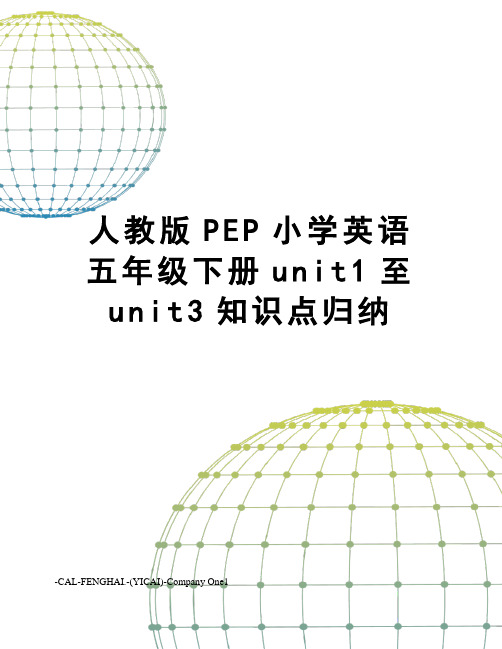
人教版P E P小学英语五年级下册u n i t1至u n i t3知识点归纳-CAL-FENGHAI.-(YICAI)-Company One1五年级下册Unit 1-3重点难点、单元单词、短语和知识点知识梳理第一单元知识点一、主要单词:do morning exercises晨练,做早操 eat breakfast吃早饭 have English class上英语课 play sports进行体育活动 eat dinner吃晚饭 eat lunch吃午饭 climb mountains爬山 go shopping购物,买东西 play the piano弹钢琴 visit grandparents看望(外)祖父母 go hiking去远足二、主要句子:When do you eat dinner你什么时候吃晚饭I eat dinner at 7:00 in the evening.我晚上七点吃晚饭。
When do you get up你什么时候起床I usually get up at 12:00 at noon.我通常在中午12点起床。
What do you do on the weekend你在周末干什么Usually I watch TV and go shopping.我通常看电视和购物。
Sometimes I visit my grandparents.有时候我去看望我的外祖父母。
I often play football.我经常踢足球。
Sometimes I go hiking.有时候我去远足。
三、同义词eat breakfast—have breakfast eat lunch—have luncheat dinner—have dinner play sports—do sports usually—often复数形式:policeman—policemen policewoman—policewomen现在分词:tell—telling三单:say—says同义句:What do you do ---What are you你是干什么的四、表示频度的副词:always总是,一直 usually通常,常常 often经常 sometimes有时候五、以复数形式出现的词组:visit grandparents plant trees介词后跟表示时间的词语时,表示在某年、某月、某个季节,某个时候(在上午,在下午,在晚上)用in;表示在某一天,在星期几用on,在具体的几点几分用at.七、too 和either的用法区别:too和either都是“也”的意思,但too用于肯定句,either用于否定句。
2021-2022学年人教版八年级英语上册Unit 1--3重要知识点汇总
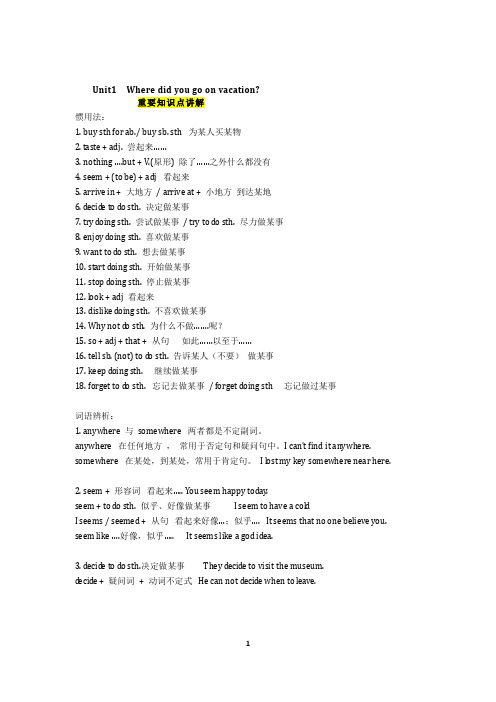
Unit1Where did you go on vacation?重要知识点讲解惯用法:1. buy sth for ab./ buy sb. sth 为某人买某物2. taste + adj. 尝起来……3. nothing ….but + V.(原形) 除了……之外什么都没有4. seem + (to be) + adj 看起来5. arrive in + 大地方/ arrive at + 小地方到达某地6. decide to d o sth. 决定做某事7. try d oing sth. 尝试做某事/ try to d o sth. 尽力做某事8. enjoy doing sth. 喜欢做某事9. want to do sth. 想去做某事10. start doing sth. 开始做某事11. stop doing sth. 停止做某事12. l ook + adj 看起来13. dislike d oing sth. 不喜欢做某事14. Why not d o sth. 为什么不做…….呢?15. so + adj + that + 从句如此……以至于……16. tell sb. (not) to d o sth. 告诉某人(不要)做某事17. keep doing sth. 继续做某事18. forget to d o sth. 忘记去做某事/ forget d oing sth 忘记做过某事词语辨析:1. anywhere 与somewhere 两者都是不定副词。
anywhere 在任何地方,常用于否定句和疑问句中。
I can’t find it anywhere. somewhere 在某处,到某处,常用于肯定句。
I lost my key somewhere near here.2. seem + 形容词看起来….. You seem happy today.seem + to d o sth. 似乎、好像做某事I seem to have a col dI seems / seemed + 从句看起来好像…;似乎…. It seems that no one believe you. seem like ….好像,似乎….. It seems like a god idea.3. decide to d o sth.决定做某事 They decide to visit the museum.decide + 疑问词+ 动词不定式 He can not decide when to leave.4. start d oing sth = start to d o sth. 开始,可与begin 互换。
starter unit1-- 3知识点
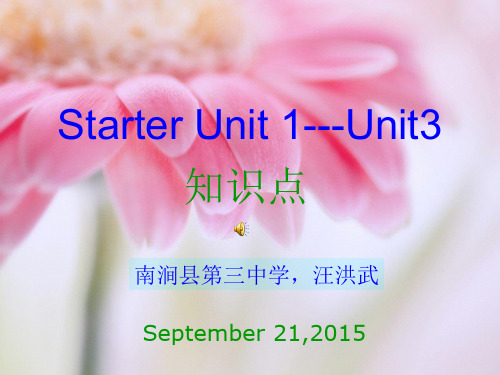
My cup is orange.我的杯子是橙色的。
6. It’s a jacket. 它是一件夹克衫。
英语冠词只有三个啊a ,an和the。a和an叫不定冠 词;the叫定冠词。a用在辅音音素开头的单词前; an 用在元音音素开头的单词前。
a pen 一只钢笔
a useful book一本有用的书。(u是元音字母,但它 读作/ju:/,以辅音因素开头)
an20h21o/3/u9 r一小时
8
7.What color is it?它是什么颜色?
本句结构中color为名词,意为“颜色”,也可写 作colour,what color是用来询问某物颜色的特 殊疑问句,回答时用It’s+表示颜色的形容词。
---What color is the key? 这把钥匙是什么颜色的?
动202词1/3/9做相应替换。
2
---How is your mother?你妈妈身体好吗?
---She is fine, thank you.她很好,谢谢。
how是疑问副词,意为“怎样;如何”,常用于 句首,引导特殊疑问句,对程度、方式或身体健 康状况等提问。
How do you go to school every day?你每天 怎样去上学?
How is your father?你爸爸身体怎么样?
Are是be动词的一种形式,意为“是”。与第二人
称代词you(你;你们),第一人称代词复数
(we我们),第三人称代词复数they(他/她/它
们 )以及复数名词连用。
2021/3/9
3
We are students.我们是学生。
Are you OK?你好吗?
Starter Unit 1---Unit3 知识点
仁爱英语九年级上册Unit1-topic3知识点总结
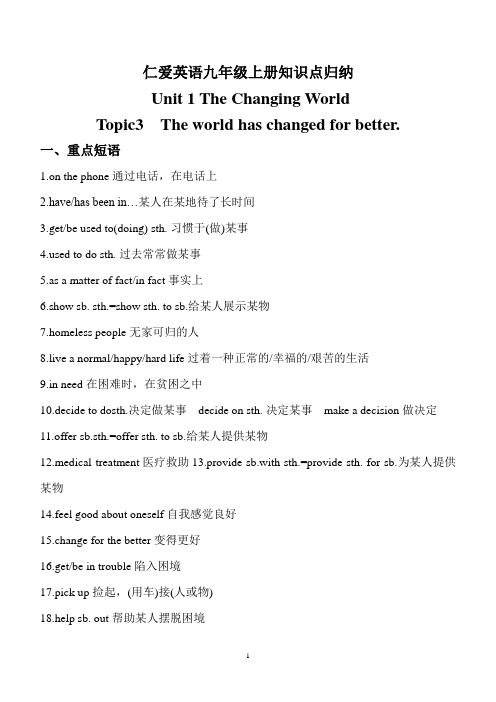
仁爱英语九年级上册知识点归纳Unit 1 The Changing WorldTopic3 The world has changed for better.一、重点短语1.on the phone 通过电话,在电话上2.have/has been in…某人在某地待了长时间3.get/be used to(doing) sth. 习惯于(做)某事ed to do sth. 过去常常做某事5.as a matter of fact/in fact事实上6.show sb. sth.=show sth. to sb.给某人展示某物7.homeless people 无家可归的人8.live a normal/happy/hard life 过着一种正常的/幸福的/艰苦的生活9.in need 在困难时,在贫困之中10.decide to dosth.决定做某事decide on sth. 决定某事make a decision 做决定11.offer sb.sth.=offer sth. to sb.给某人提供某物12.medical treatment 医疗救助13.provide sb.with sth.=provide sth. for sb.为某人提供某物14.feel good about oneself 自我感觉良好15.change for the better 变得更好16.get/be in trouble 陷入困境17.pick up 捡起,(用车)接(人或物)18.help sb. out 帮助某人摆脱困境19.the cause of 导致……的原因the result of ……的结果the reas on for ……的原因20.on purpose 故意21.have a problem with…有……问题22.think of… as…把……视为……23.raise one’s children抚养孩子24.afford sth. for sb. 为某人支付/担负某物 afford to do sth. 担负得起做某事25.make contributions to(doing)sth.在(做)某事方面做出贡献26.as a result 结果27.without th e help of…没有……的帮助lions of 数百万29.according to 据……所说,按……所报道30.plenty of 大量的二、单词转换1.visit v./n.参观,访问,游览 visitor n.参观者,来访者2.chemical adj.化工的,化学的 chemistry n.化学,化学物质3.homeless adj.无家的 homelessness n.无家可归4.treat v.对待,治疗 treatment n.疗法,治疗5.basic adj.基本的,基础的 base n.基础6.important adj.重要的 importance n.重要性,重要三、重点句型1.You have been in New York for a long time.你已经在纽约待了很长时间了。
人教pep版英语五年级上册Unit 1-Unit 3单元知识点复习课件
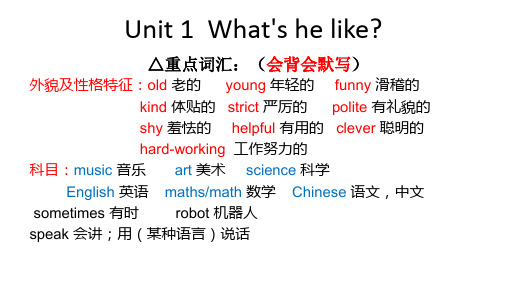
2. She's clever and polite. (对划线部分提问)
△语音
• 字母y的发音 • 一、y前有元音字母就发/I/
• baby happy windy sunny sorry candy many family party
• 婴儿 开心的 有风的 晴朗的 对不起 糖果 许多 家庭 聚会
6. be 动词的三种形式 am, is, are 与人称代词连用的用法:
I + am,
He, she, it ,人名、 物名+ is
We, you, they + are
7. Ms. , Miss , Mrs. , Mr. 的区别:
女 she
男 he
习题: 1. Do you often read books in this park?(作否定回答)
read books(看书)
play football(踢足球)
play ping-pong(打乒乓球)
play the pipa(弹琵琶)
listen to music(听音乐)
clean my room(打扫我的房间) draw pictures(画画)
play sports(做运动)
△句型:
• 二、y前没有元音字母就发/aɪ/
• by 乘坐 my 我的 why 为什么 cry 哭 fly 飞
Unit1 What's he like? 单元写作
话题:介绍自己、朋友或老师等熟悉的人物,如:My …teacher/friend/…
思路导引: (1)开头:交代人物的身份 I have a/an…. He/She is… (2)中间: 1)体貌 He/ She is tall/strong… He/She has …hair/eyes… 2)性格 He/She is strict/kind… 3)爱好 He/She likes playing pingi-pong/… (运动类)或 He/She like reading books/…(文艺类) on the weekend. (3)结尾:评价人物或抒发对人物的情感 I like him/her very much.
Unit1-3知识点归纳
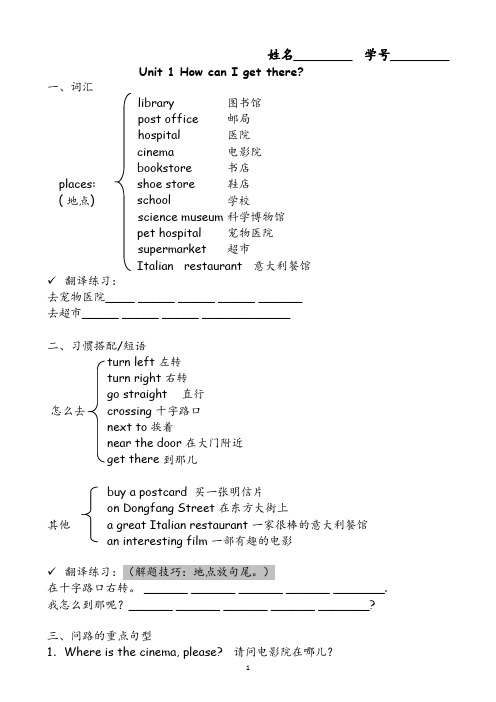
姓名_______学号_______ Unit1How can I get there?一、词汇library图书馆post office邮局hospital医院cinema电影院bookstore书店places:shoe store鞋店(地点)school学校science museum科学博物馆pet hospital宠物医院supermarket超市Italian restaurant意大利餐馆✓翻译练习:去宠物医院_________________________去超市___________________________二、习惯搭配/短语turn left左转turn right右转go straight直行怎么去crossing十字路口next to挨着near the door在大门附近get there到那儿buy a postcard买一张明信片on Dongfang Street在东方大街上其他a great Italian restaurant一家很棒的意大利餐馆an interesting film一部有趣的电影✓翻译练习:(解题技巧:地点放句尾。
)在十字路口右转。
_______________________________.我怎么到那呢?_______________________________?三、问路的重点句型1.Where is the cinema,please?请问电影院在哪儿?next to the bookstore紧挨着书in front of the school.在学校的前面.It’s behind the park在公园的后面near the zoo.在动物园的附近.over there在那边✓翻译练习:打扰一下,博物馆商店在哪里?_________,___________________________?它在那边。
________________________.2.Excuse me,is there a cinema near here?请问这附近有电影院吗?Yes,there is./No,there isn’t.有./没有。
2023年一轮课本练习 七下Unit 1-Unit 3(解析版)
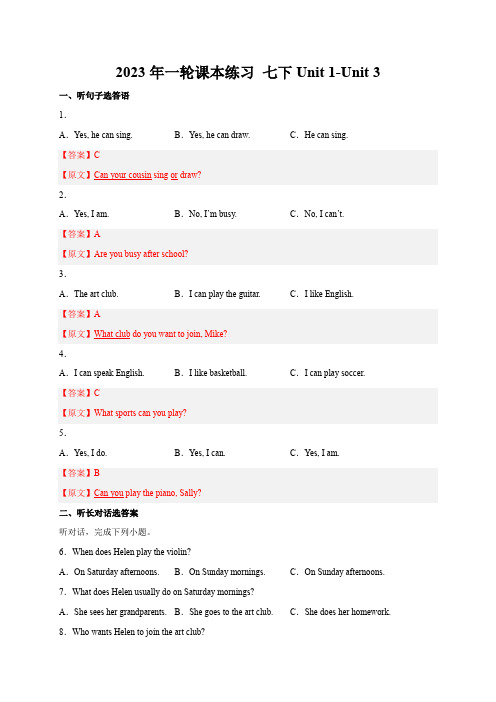
2023年一轮课本练习七下Unit 1-Unit 3一、听句子选答语1.A.Yes, he can sing.B.Yes, he can draw.C.He can sing.2.A.Yes, I am.B.No, I’m busy.C.No, I can’t.【答案】A【原文】Are you busy after school?3.A.The art club.B.I can play the guitar.C.I like English.【答案】A【原文】What club do you want to join, Mike?4.A.I can speak English.B.I like basketball.C.I can play soccer.【答案】C【原文】What sports can you play?5.A.Yes, I do.B.Yes, I can.C.Yes, I am.【答案】B【原文】Can you play the piano, Sally?二、听长对话选答案听对话,完成下列小题。
6.When does Helen play the violin?A.On Saturday afternoons.B.On Sunday mornings.C.On Sunday afternoons. 7.What does Helen usually do on Saturday mornings?A.She sees her grandparents.B.She goes to the art club.C.She does her homework. 8.Who wants Helen to join the art club?A.Her father.B.Her mother.C.Her grandparents.【答案】6.C7.A8.B【原文】M: Helen, what do you usually do on weekends?W: I usually play the violin, see my grandparents and go to the art club.M: When do you usually play the violin?W: On Sunday afternoons.M: Well, do you see your grandparents on Saturdays?W: Yes. I usually go in the morning.M: I see. You’re in the art club. Do you like to draw?W: No. My mother wants me to join the art club.听对话,完成下列小题。
人教版七年级英语上册单词预备篇1-3单元

人教版七年级英语上册单词表S t a r t e r U n i t1-3StarterUnit1good好的morning早晨;上午Goodmorning!早上好!hi嗨;喂hello你好;喂afernoon下午Goodafternoon!下午好evening晚上;傍晚Goodevening!晚上好!how怎样;如何are是you你;你们Howareyou?你好吗?I我am是fine健康的;美好的thanks感谢;谢谢OK好;可以HB(铅笔芯)硬黑CD光盘;激光唱片BBC英国广播公司Alice艾丽斯Bob鲍勃Cindy辛迪Dale戴尔Eric埃里克Frank弗兰克Grace格雷丝Helen海伦StarterUnit2what什么is是this这;这个in用;以English英语;英格兰的;英语的inEnglish用英语map地图cup杯子ruler尺;直尺pen笔;钢笔orange橙子jacket夹克衫;短上衣key钥匙quilt被子;床罩it它a一(人,事,物)that那;那个spell用字母拼;拼写please请NBA(美国)全国篮球协会P停车场;停车位Kg千克;公斤StarterUnit3color颜色red红色yellow黄色green绿色blue蓝色black黑色white白色purple紫色brown棕色the指已提到或易领会到的人或事物now现在;目前see理解;明白can能;会say说;讲my我的S小号的M中号的L大号的UFO不明飞行物CCTV中国中央电视台。
- 1、下载文档前请自行甄别文档内容的完整性,平台不提供额外的编辑、内容补充、找答案等附加服务。
- 2、"仅部分预览"的文档,不可在线预览部分如存在完整性等问题,可反馈申请退款(可完整预览的文档不适用该条件!)。
- 3、如文档侵犯您的权益,请联系客服反馈,我们会尽快为您处理(人工客服工作时间:9:00-18:30)。
Text
General Introduction to Environmental Science and Engineering
Environmental Science and Engineering program: In general, environment refers to the surroundings of an object, or the nature environment, all living and nonliving things that occur naturally on earth. The Environmental Science and Engineering (ESE) program reaches across traditional disciplinary boundaries in its aim to provide a comprehensive understanding of our complex environment and oe engineering solutions to environmental problems. Students in ESE receive a broad education and carry out research addressing some of the grand science and engineering challenges of our times:
Unit 1
Unit goals: describing environmental science giving profiles of environmental engineering vocabulary building: words and terms of environmental science & engineering
Research and teaching in Environmental Science and Engineering (ESE) span the large scales of global climate variations, the local scales of urban air pollution, and the microscales of microbial ecosystems. Reflecting the interdisciplinary nature of the ESE program, it unites scientists and engineers from Caltech's Division of Geological and Planetary Sciences, Division of Engineering and Applied Science, and Division of Chemistry and Chemical Engineering, as well as from NASA's Jet Propulsion Laboratory. Jointly they address, for example, how climate has varied in the past and how it may change in the future, how biogeochemical cycles and chemical reactions control the composition of the global atmosphere and local air quality as well as the Earth’s global energy balance, and how efficient and effective ways of producing biofule for remediating toxic waste can be found. The methods employed in research projects include laboratory studies of fundamental chemical and biological processes; field studies of microbial ecology and of atmospheric chemistry; and computational and theoretical studies of chemical and physical processes on molecular to global scales.
Students enter the ESE program with diverse backgrounds, from the basic sciences of physics, chemistry, and biology to applied science and engineering fields. The curriculum emphasizes interdisciplinary knowledge and is broad, yet it is flexible so that different backgrounds and focus areas can be accommodated.[1]
Related areas of study include environmental studies and environmental engineering. Environmental studies incorporates more of the social sciences for understanding human relationships, perceptions and policies towards the environment. Environmental engineering focuses on design and technology for improving environmental quality.
Environmental science: Environmental
science is an interdisciplinary academic field that integrates physical and biological sciences, (including but not limited to Ecology, Physics, Chemistry, Biology, Soil Science, Geology, Atmospheric Science and Geography) to the study of the environment, and the solution of environmental problems. Environmental science provides an integrated, quantitative, and interdisciplinary approach to the study of environmental systems.
and climate change?
How do microorganisms drive nutrient cycles in
oceans and on land, and how can they be used to produce biofuels or remediate toxic waste?
Fig.1 Blue Marble composite images generated by NASA in 2001 (left) and 2002 (right).
Environmental science came alive as a substantive, active field of scientific investigation in the 1960s and 1970s driven by (a) the need for a multi-disciplinary approach to analyze complex environmental problems, (b) the arrival of substantive environmental laws requiring specific environmental protocols of investigation and (c) the growing public awareness of a need for action in addressing environmental problems. Events that spurred this development included the publication of Rachael Carson's landmark environmental book Silent Spring along with major environmental issues becoming very public, such as the 1969 Santa Barbara oil spill, and the Cuyahoga River of Cleveland, Ohio, "catching fire" (also in 1969), and helped increase the visibility of environmental issues and create this new field of study.
By uniting scientists and engineers from a variety of disciplines and focusing on fundamental questions with long reach, the ESE program strives to have an outsize influence on the field.
